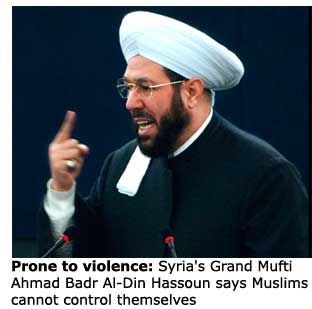The Times reports that Rowan Williams, the Archbishop of Canterbury, has called for new laws to punish “thoughtless and cruel” styles of speaking.
However, owing to the Archbishop’s opaque style of discourse, it is unclear whether or not Times reporter Ruth Gledhill is correct in her interpretation of his James Callahan Memorial Lecture. Other reports, from more overtly religious sources, do not put the same spin on it.
Whichever way you look at it, he was talking drivel:
The grounds for legal restraint in respect of language and behaviour offensive to religious believers are pretty clear: the intention to limit or damage a believer’s freedom to be visible and audible in the public life of a society is plainly an invasion of what a liberal society ought to be guaranteeing; and the obvious corollary is that the creation of an offence of incitement to religious hatred is a way of avoiding the civil disorder that threatens when a group comes to feel that it has been unjustly excluded.
Non sequitur upon non sequitur. Language offensive to religious believers is not the same as intention to limit a believer’s freedom to be visible and audible in public life; and the apparent admission in the last sentence is that the main purpose of incitement to religious hatred laws is to stop religious people being provoked into committing acts of violence.
He does agree that there is no case for the retention of the blasphemy law, but then he goes on to muddy the waters further by making vague suggestions about power:
Since the old offence of blasphemy – as we have seen – no longer works effectively to do this, there is no real case for its retention. How adequately the new laws will meet the case remains to be seen; I should only want to suggest that the relative power and political access of a group or person laying charges under this legislation might well be a factor in determining what is rightly actionable.
Is this man incapable of clarity? Have another go why don’t you, Archbish:
It is clear that the old blasphemy law is unworkable and that its assumptions are not those of contemporary lawmakers and citizens overall. But as we think about the adequacy of what is coming to replace it, we should not, I believe, miss the opportunity of asking the larger questions about what is just and good for individuals and groups in our society who hold religious beliefs.
This appears to be the section which has led the Times to shout that he is calling for new legislation. It’s not quite there, is it?
Terry Sanderson of the National Secular Society, commenting on the Times’ interpretation of Williams’ speech, is understandably worried.
It is as if the prolonged and widespread debate on the recently-introduced religious hatred legislation had never happened. Dr Williams takes us right back to the beginning with his special pleading for the protection of religious feelings – in other words, another form of blasphemy law that would be even worse than the one we’re about to ditch.
Let’s wait and see. The Archbishop of Cant has been forced in the past to issue clarifying statements. Maybe one day he will get it right the first time.
UPDATE: (2nd Feb) Ophelia Benson has read the Archbishop’s speech, so you don’t have to. It does seem that he was indeed suggesting, in his roundabout way, that Parliament should indeed legislate to protect certain groups from cruel and hurtful speech or publications.

 While the world waits for Geert Wilders’ provocative
While the world waits for Geert Wilders’ provocative 
 Far-right Dutch politician
Far-right Dutch politician 
